liver support
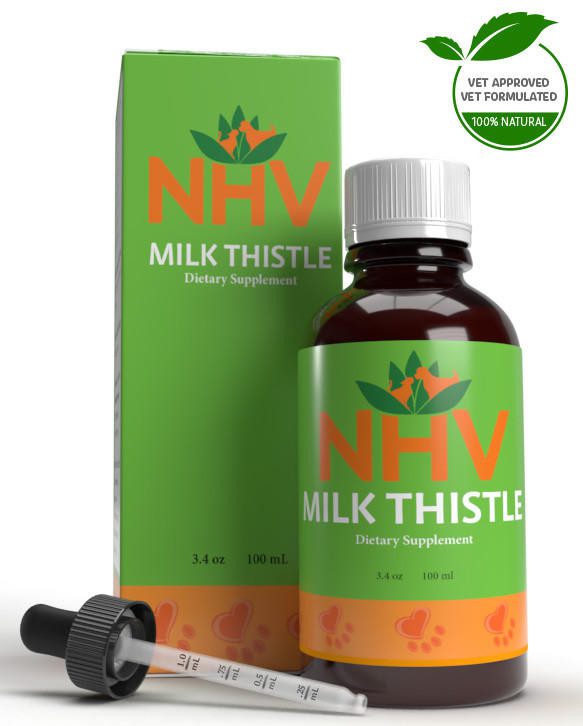
free shipping over $100 (USA & Canada)
1-877-937-4372 the pet expert hotline
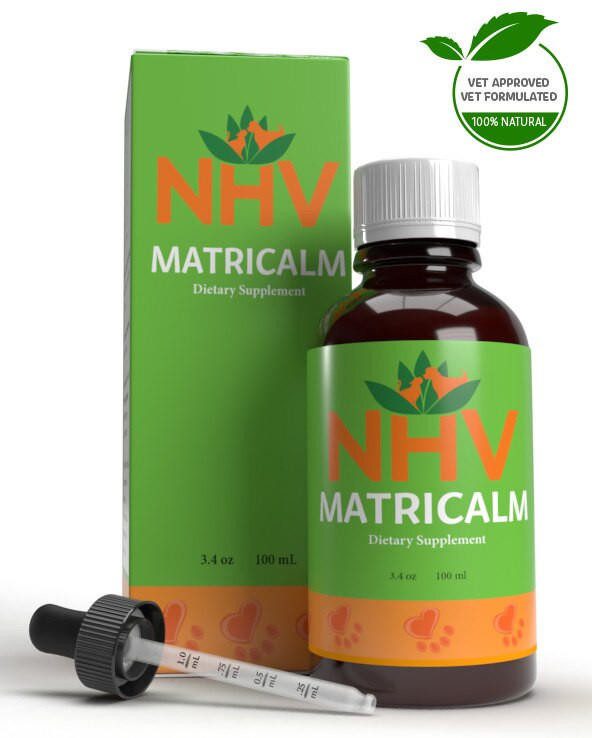
All-Natural Supplements for Parrots, Budgies and Other Birds

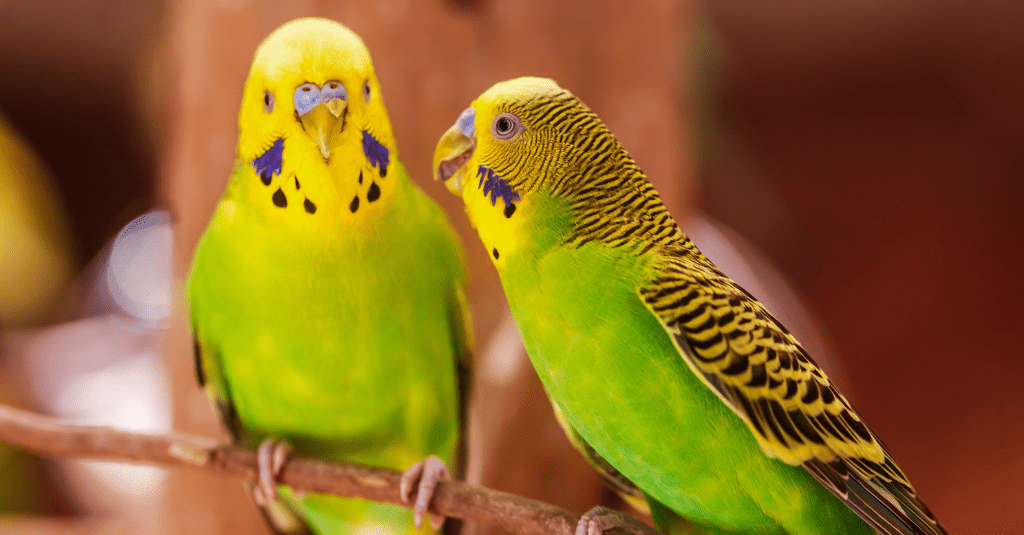
Did you know that other less traditional pets can also benefit from natural herbal supplements? However, each feathery, scaly, or furry friend has a unique little body and different needs. This is especially true with exotic animals like birds! So here are some tips on how to give supplements to your feathered kiddos.
Many of the illnesses seen in pet birds have their basis in malnutrition, and supplements can help provide any lacking vitamins and minerals. Not only can NHV formulas help fill nutritional voids that can lead to health problems, but they may also offer immunity support and help fight common issues in birds like anxiety, liver issues, renal insufficiency, hepatic disease, respiratory impairment, musculoskeletal disease, and reproductive problems.
We have seen promising results in birds taking NHV Milk Thistle for liver issues in a clinical trial conducted by the University of Tennessee’s Avian and Exotics Division. We were also able to help Sunny the Cockatiel fight liver cancer with the help of ES-Clear and Milk Thistle.
So yes, birds can, and sometimes should supplement their diets. The most important thing is making sure that your winged friend is taking the correct supplements for their needs. So your first step should be to discuss any nutritional changes with your avian vet. Once you’ve received the specialist’s approval, we are always here to help guide you!
Birds are intelligent animals that interact with their environment and socialize with people and other animals. So, many of the reasons people develop behavioral problems can also apply to birds. Boredom and loneliness, for example, can contribute to anxious behavior like feather plucking.
Behavioral issues in birds like anxiety and aggression can also compromise their immune system
Stress in birds can also occur when their usual schedule is disturbed, as one would expect during a move, or if essential needs like proper diet, sunlight, and fresh air are not being met. A set daily routine and a bird calming supplement, like NHV Matricalm, are just two ways to reduce stress in your bird.
Behavioral issues in birds like anxiety and aggression can also compromise their immune system, cause malnutrition, or result in unhealthy weight loss. Stress can also lead female birds of breeding age to become egg-bound, which is life-threatening and requires medical intervention.
Read more about how NHV Matricalm worked as a natural bird calming supplement to help turn George into a well-behaved Amazon Parrot.
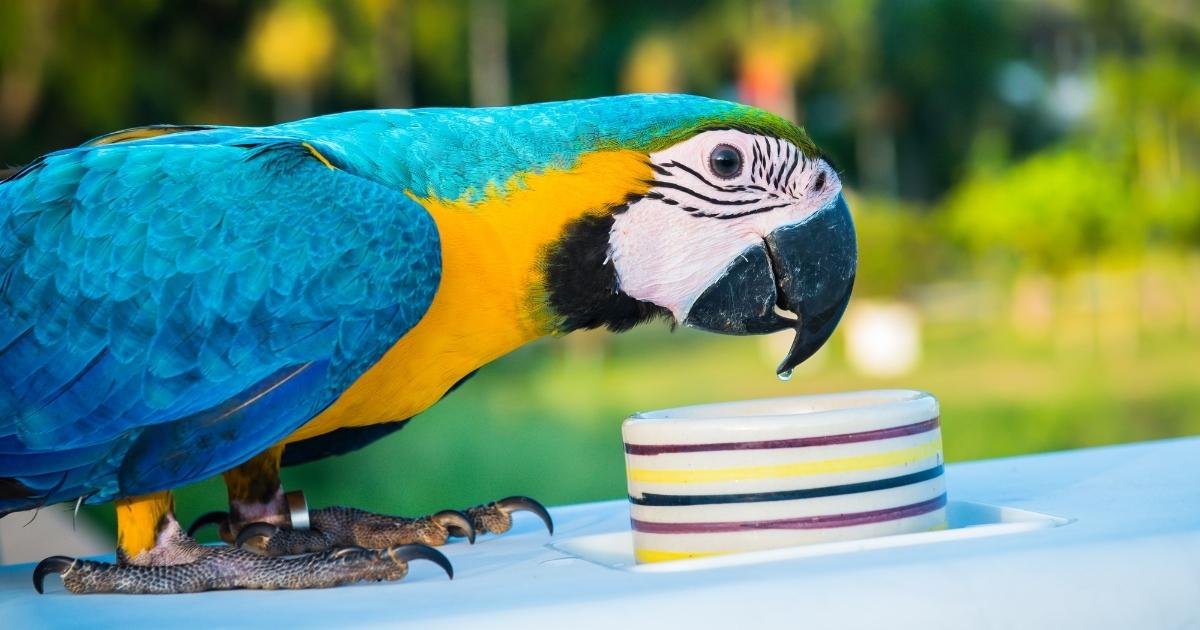
Our herbal formulas are safe for all sorts of animals, little or small, as long as the recommended dosages are followed. When giving our natural supplements to birds, give 1 drop for every 2 lbs of body weight, twice a day (8-12 hours apart).
You can mix the supplement to your bird’s food or your little one’s favorite treat like fruits, vegetables, wet pieces of lettuce or kale, millet, or canned/dried mealworms. The supplements can also be given directly to the bird’s mouth with the dropper provided.
All supplements should be introduced slowly to a bird’s diet to avoid upsetting the gastrointestinal system or causing changes in their feces and urine. It is essential to follow the avian veterinarian’s instructions when introducing the supplements. Our pet experts are also here to answer any questions you might have about the best way to give NHV supplements to your bird.
Be it feathers, fur, or scales, NHV has something to help support all sorts of pets. We are here to work alongside your avian vet to help you decide which supplements can help support your bird. Feel free to click on the button below to start chatting with someone in our Pet Experts team!
liver support

Natural Pet Bird Liver Support
buy 2 and save $3
3 month supply for a small to medium size pet
What is it?
NHV Milk Thistle is natural support for liver disease in birds that helps support gentle detoxification, encourages liver regeneration, and may help improve digestion (increases bile flow).
How Does it Work?
Why Should I Trust It?
Vet-formulated and easy to give.


What is it?
NHV Milk Thistle is natural support for liver disease in birds that helps support gentle detoxification, encourages liver regeneration, and may help improve digestion (increases bile flow).
How Does it Work?
Why Should I Trust It?
Vet-formulated and easy to give.

The liver’s job is to filter anything that your feathery friend eats or drinks. If your pet gets sicks, it is likely that their liver is under-functioning so harmful toxins may start to build up. The most common liver issue in birds to affect our feathery friends is fatty liver disease a.k.a. Hepatic lipidosis. It is most often seen in Amazon parrots, budgies, cockatoos, cockatiels, lovebirds, and Quaker parrots.
Some common symptoms may include:
The liver is one of the most important organs in the body. It is responsible for many metabolic functions, such as digesting food and filtering bacteria out of the blood, and more. Unfortunately, acute and chronic liver disease is fairly common in our feathered friends. This is why proactive liver support is very beneficial for your pet bird. Milk Thistle contains the active compound silymarin which has been used for thousands of years for its numerous health benefits.
We know that you have a special bond with your bird. Their health and wellness mean everything to us! That’s why we made our supplements 100% natural, easy to administer (liquid formula), and made with only the finest plant-based ingredients. For any questions or concerns about your feathery friend’s liver health, get in touch with an NHV Pet Expert - we’re here to help!
Made with the finest, organically grown, or ethically harvested herbs. Made specifically for pets, vet-formulated, and vet approved.
For birds: 1 drop per two pounds twice a day
How to Administer
Shake well before use. The easiest method is to use the dropper provide and places the drops into your pet’s food or favorite treat. You can also use the dropper and squirt directly into the pet’s mouth.
Some pets can be finicky, if this occurs consider hiding the drops in foods most pet’s love such as mashed banana, strawberry or another favorite treat.
For Best Results
Herbal dietary supplements are beneficial to the health and wellbeing of your pet and are safe for long-term use. Every pet responds to natural herbal supplements differently, therefore it is important to be consistent and administer the product daily. Supplements generally take two to four weeks to take effect, however this will vary from one animal to the next.
Product Storage
All NHV Natural Pet Products are pure herbal extracts and contain no artificial additives, preservatives or coloring. Shelf life after opening is 6 months and must be refrigerated after opening.
Cautions and Contraindications
Do not use Milk Thistle in pregnant or nursing animals. Speak to your vet before using our products. A second visit is recommended if your pet’s condition does not improve, or deteriorates after continued use of the supplements.
All information provided by NHV Natural Pet Products is for educational purposes only.
The liver’s job is to filter anything that your feathery friend eats or drinks. If your pet gets sicks, it is likely that their liver is under-functioning so harmful toxins may start to build up. The most common liver issue in birds to affect our feathery friends is fatty liver disease a.k.a. Hepatic lipidosis. It is most often seen in Amazon parrots, budgies, cockatoos, cockatiels, lovebirds, and Quaker parrots.
Some common symptoms may include:
The liver is one of the most important organs in the body. It is responsible for many metabolic functions, such as digesting food and filtering bacteria out of the blood, and more. Unfortunately, acute and chronic liver disease is fairly common in our feathered friends. This is why proactive liver support is very beneficial for your pet bird. Milk Thistle contains the active compound silymarin which has been used for thousands of years for its numerous health benefits.
We know that you have a special bond with your bird. Their health and wellness mean everything to us! That’s why we made our supplements 100% natural, easy to administer (liquid formula), and made with only the finest plant-based ingredients. For any questions or concerns about your feathery friend’s liver health, get in touch with an NHV Pet Expert - we’re here to help!
Made with the finest, organically grown, or ethically harvested herbs. Made specifically for pets, vet-formulated, and vet approved.
For birds: 1 drop per two pounds twice a day
How to Administer
Shake well before use. The easiest method is to use the dropper provide and places the drops into your pet’s food or favorite treat. You can also use the dropper and squirt directly into the pet’s mouth.
Some pets can be finicky, if this occurs consider hiding the drops in foods most pet’s love such as mashed banana, strawberry or another favorite treat.
For Best Results
Herbal dietary supplements are beneficial to the health and wellbeing of your pet and are safe for long-term use. Every pet responds to natural herbal supplements differently, therefore it is important to be consistent and administer the product daily. Supplements generally take two to four weeks to take effect, however this will vary from one animal to the next.
Product Storage
All NHV Natural Pet Products are pure herbal extracts and contain no artificial additives, preservatives or coloring. Shelf life after opening is 6 months and must be refrigerated after opening.
Cautions and Contraindications
Do not use Milk Thistle in pregnant or nursing animals. Speak to your vet before using our products. A second visit is recommended if your pet’s condition does not improve, or deteriorates after continued use of the supplements.
All information provided by NHV Natural Pet Products is for educational purposes only.
multivitamin support
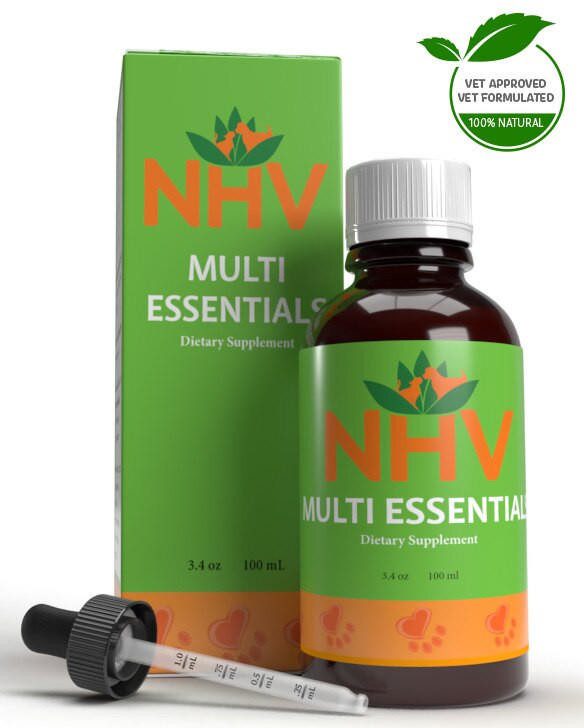
All-Natural Bird Health Supplements
buy 2 and save $3
3 month supply for a small to medium size pet
As pet parents, we all want our pets to live long and healthy lives. To help your bird age with ease, our bird health supplements are formulated to fill nutritional voids, help maintain many body processes and encourage healthy skin and bones.

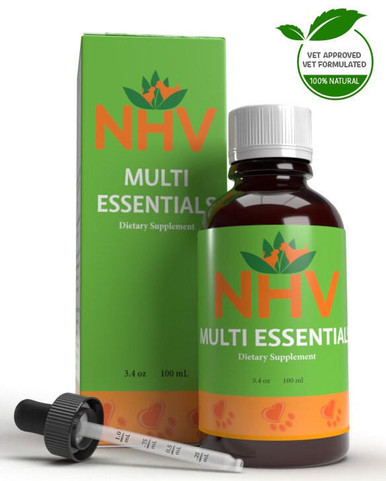
As pet parents, we all want our pets to live long and healthy lives. To help your bird age with ease, our bird health supplements are formulated to fill nutritional voids, help maintain many body processes and encourage healthy skin and bones.

Hypovitaminosis, or low vitamin levels, can have detrimental effects on a bird’s health and may lead to many different health conditions. Good health starts with good nutrition, so for all of those birds out there who are looking for bird vitamins or added support when fighting off an illness, our Multi Essentials for Birds offers a liquid formulation that is packed full of nutrients. Whether you have canaries, parakeets, love birds, or budgies, our blend of 11 nutrient-dense herbs is formulated to help maintain many body processes, help metabolize vitamins and minerals, and improve digestion. It is beneficial support for birds exposed to environmental toxins as well as encourages healthy skin and feathers. All of our supplements are made with full-spectrum plant extracts that are crafted specifically for pets. Full-spectrum means that all of the vitamins, minerals, and trace elements are kept intact during the extraction process to make it absorbable for your pet.
Common signs that your bird may be suffering from a vitamin deficiency:
Having a nutritionally deficient diet can cause a lot of stress and discomfort for your feathery friend. Our Multi Essentials for Birds is an all-natural herbal remedy formulated to help fill nutritional voids, help reduce fatigue and help to increase energy levels. Ingredients like chickweed, dandelion, and yucca, help improve the absorption of nutrients and aid effective digestion. Marshmallow adds a rich source of calcium to promote strong bones, while kelp and Asian ginseng help to maintain healthy metabolism and encourage overall vitality. The many other nutritive ingredients help maintain vital body processes and promote healthy blood circulation.
We know your pets are your family. That’s why we made our bird health supplements100% natural, easy to administer (liquid formula), and made with only the best organically grown, or wildcrafted ingredients. For any questions or concerns about your bird’s health, don’t hesitate to get in touch with an NHV Pet Expert - we’re always here to help!
Made with the finest, organically grown, or ethically harvested herbs. Made specifically for pets, vet-formulated and vet approved.
For birds: 1 drop per two pounds twice a day
How to Administer
Shake well before use. The easiest method is to use the dropper provide and place the drops into your bird's favorite treat. You can also use the dropper and squirt directly into the bird’s mouth.
For Best Results
Herbal dietary supplements are beneficial to the health and wellbeing of your pet and are safe for long-term use. Every pet responds to natural herbal supplements differently, therefore it is important to be consistent and administer the product daily. Supplements generally take two to four weeks to take effect, however this will vary from one animal to the next.
Product Storage
All NHV Natural Pet Products are pure herbal extracts and contain no artificial additives, preservatives or coloring. Shelf life after opening is 6 months and must be refrigerated after opening.
Cautions and Contraindications
Do not use Multi Essentials in pregnant or nursing animals. Speak to your vet before using our products. A second visit is recommended if your pet’s condition does not improve, or deteriorates after continued use of the supplements.
All information provided by NHV Natural Pet Products is for educational purposes only.
Hypovitaminosis, or low vitamin levels, can have detrimental effects on a bird’s health and may lead to many different health conditions. Good health starts with good nutrition, so for all of those birds out there who are looking for bird vitamins or added support when fighting off an illness, our Multi Essentials for Birds offers a liquid formulation that is packed full of nutrients. Whether you have canaries, parakeets, love birds, or budgies, our blend of 11 nutrient-dense herbs is formulated to help maintain many body processes, help metabolize vitamins and minerals, and improve digestion. It is beneficial support for birds exposed to environmental toxins as well as encourages healthy skin and feathers. All of our supplements are made with full-spectrum plant extracts that are crafted specifically for pets. Full-spectrum means that all of the vitamins, minerals, and trace elements are kept intact during the extraction process to make it absorbable for your pet.
Common signs that your bird may be suffering from a vitamin deficiency:
Having a nutritionally deficient diet can cause a lot of stress and discomfort for your feathery friend. Our Multi Essentials for Birds is an all-natural herbal remedy formulated to help fill nutritional voids, help reduce fatigue and help to increase energy levels. Ingredients like chickweed, dandelion, and yucca, help improve the absorption of nutrients and aid effective digestion. Marshmallow adds a rich source of calcium to promote strong bones, while kelp and Asian ginseng help to maintain healthy metabolism and encourage overall vitality. The many other nutritive ingredients help maintain vital body processes and promote healthy blood circulation.
We know your pets are your family. That’s why we made our bird health supplements100% natural, easy to administer (liquid formula), and made with only the best organically grown, or wildcrafted ingredients. For any questions or concerns about your bird’s health, don’t hesitate to get in touch with an NHV Pet Expert - we’re always here to help!
Made with the finest, organically grown, or ethically harvested herbs. Made specifically for pets, vet-formulated and vet approved.
For birds: 1 drop per two pounds twice a day
How to Administer
Shake well before use. The easiest method is to use the dropper provide and place the drops into your bird's favorite treat. You can also use the dropper and squirt directly into the bird’s mouth.
For Best Results
Herbal dietary supplements are beneficial to the health and wellbeing of your pet and are safe for long-term use. Every pet responds to natural herbal supplements differently, therefore it is important to be consistent and administer the product daily. Supplements generally take two to four weeks to take effect, however this will vary from one animal to the next.
Product Storage
All NHV Natural Pet Products are pure herbal extracts and contain no artificial additives, preservatives or coloring. Shelf life after opening is 6 months and must be refrigerated after opening.
Cautions and Contraindications
Do not use Multi Essentials in pregnant or nursing animals. Speak to your vet before using our products. A second visit is recommended if your pet’s condition does not improve, or deteriorates after continued use of the supplements.
All information provided by NHV Natural Pet Products is for educational purposes only.
Published: July 20, 2022